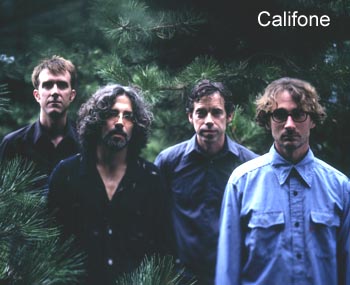Califone interview
Califone
The End Is The Beginning
At the bottom of a career-threatening funk following the tour behind Califone’s 2004 release, Heron King Blues, Tim Rutili happened across an old mix CD a friend had given him, and found his salvation somewhere in the middle. It came via Psychic TV’s “The Orchids,” released on the band’s 1983 album, Dreams Less Sweet: “In the morning after the night I fall in love with the light it is so clear I realize and here at last I have my eyes . . .”
Appearing: 10/21 at Empty Bottle (1035 N. Western) in Chicago.
“I hadn’t really listened to Psychic TV for years,” Rutili explains via e-mail. “It didn’t really hit me when I first heard it, but this time around it knocked me over.

“That song is very abstract and also clear as a bell for me. It kicked some cobwebs loose and made me want to write some songs after thinking I was pretty much done writing songs and playing in a band.”
“The Orchids” was able to awaken Rutili’s muse largely because of an evolution in his outlook. “I guess I got tired of hating myself and being depressed. I’m still working through it but I’m glad I’m still here and grateful for the opportunity to play music and enjoy my family and friends.”
In composing Roots & Crowns for Thrill Jockey (the name describes the connections between the pinnacles we achieve and the depths from which we climb), Rutili streams his consciousness to dissect the cobwebs he shook loose, and leaves them behind in a quivering heap of metaphors. The result could hardly be called upbeat, but there are traces of love and redemption everywhere.
“Rose Petal Ear” isn’t even ambiguous: its pure tenderness represents perhaps the closest to a deeply felt love song in Rutili’s catalog. “‘Rose Petal Ear’ started with the words,” he elaborates. “That doesn’t usually happen.” The song also exemplifies Califone’s radically experimental approach to arranging sounds. “I recorded it at home and at my friend’s studio in L.A.,” Rutili says. “We wanted the bass to sound like it was coming out of the trunk of a car. Jim [Becker] and [producer Brian Deck] mic’d a tin heater and aimed a bass speaker at it.”
The rest of the collection reflects the influence of “The Orchids'” tension between dark images and hopeful ones, with the hopeful ones rising. It represents something of a rebirth for Califone in the wake of its much darker 2004 release and the subsequent hiatus of the band.
Heron King depicted a sojourn on the dark side, even compared to the characteristically shadowed lyric imagery of Rutili’s earlier work. Arrangements plumbed the depths of blues tempos and moods.
“On Heron King we started out with improvisations based heavily on [Captain Beefheart’s 1970 album] Mirror Man,” Rutili writes. “We sliced and diced and added and subtracted and ended up with something really different. Michael Krassner produced that record. I think he didn’t sleep the entire time we were recording, so I guess it’s semi-conscious, Edison-cat-nap, bad-dream blues-based. We did it quickly, which is very different for us [so] we were wiped out . . . but we were all pretty happy with the way it turned out. ”
From the time Califone released its first full-length CD, Roomsound, in 2001 through the end of the Heron King Blues tour, the band maintained a nonstop schedule, releasing four albums and touring almost constantly. After the tour, Califone members pursued other projects. Becker worked on soundtracks and joined Ben Massarella in recording and performing with other bands.
— Linda Ray
To learn more of what Rutili did to keep Califone together, pick up the October issue of Illinois Entertainer throughout Chicagoland.









